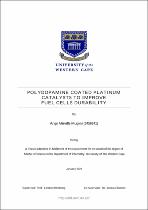Polydopamine coated platinum catalysts to improve fuel cells durability
Abstract
Polymer electrolyte membrane fuel cells (PEMFC) are in the forefront of energy production and have drawn a great deal of attention in both fundamental and application in recent years. It is a promising energy system used in commercialized electric vehicles presenting with the following advantages: low-temperature operation, high power density (40%–60%), nearly zero pollutants compared to conventional internal combustion gasoline vehicles, simple structure, and so on. There are, however, two major obstacles which obstruct PMFCs pathway to commercialization— durability and cost. Recent advances in PEMFC systems showed the most common fuel cell catalysts to be Platinum (Pt) (or platinum alloys) supported by high surface carbon in both the cathode and anode. However, carbon is very susceptible to corrosion and results in lower durability of Pt supported catalysts.

